The Poles can never have had much doubt that blaming Russia for the Second World War would upset Vladimir Putin. It was rather like poking a tiger with a pointed stick: it could never end well. Putin has retaliated verbally, mentioning it five times during the run-up to Christmas, including at a Defence Ministry board meeting, in a meeting with leaders of the Duma and again while talking to important business people. He also said he would write an article about it. He seems very sensitive, but then, like most Russians, he sees any attack on the Soviet victory in what Russians call the Great Patriotic War as an attack on Russia itself. However, a newly-assertive Poland, with the right-wing nationalist Law and Justice Party (PIS) comfortably back in charge, felt it was safe to put a resolution before the European Parliament ascribing equal blame to Russia and Germany for the war which began 81 years ago (it was tabled to mark the 80th anniversary). The resolution, passed in September, 2019, after much reference to the notorious agreement between Vyacheslav Molotov for the Soviet Union and Joachim von Ribbentrop for Nazi Germany, “Stresses that the Second World War, the most devastating war in Europe’s history, was started as an immediate result of the notorious Nazi-Soviet Treaty on Non-Aggression of 23 August 1939, also known as the Molotov-Ribbentrop Pact, and its secret protocols, whereby two totalitarian regimes that shared the goal of world conquest divided Europe into two zones of influence.”
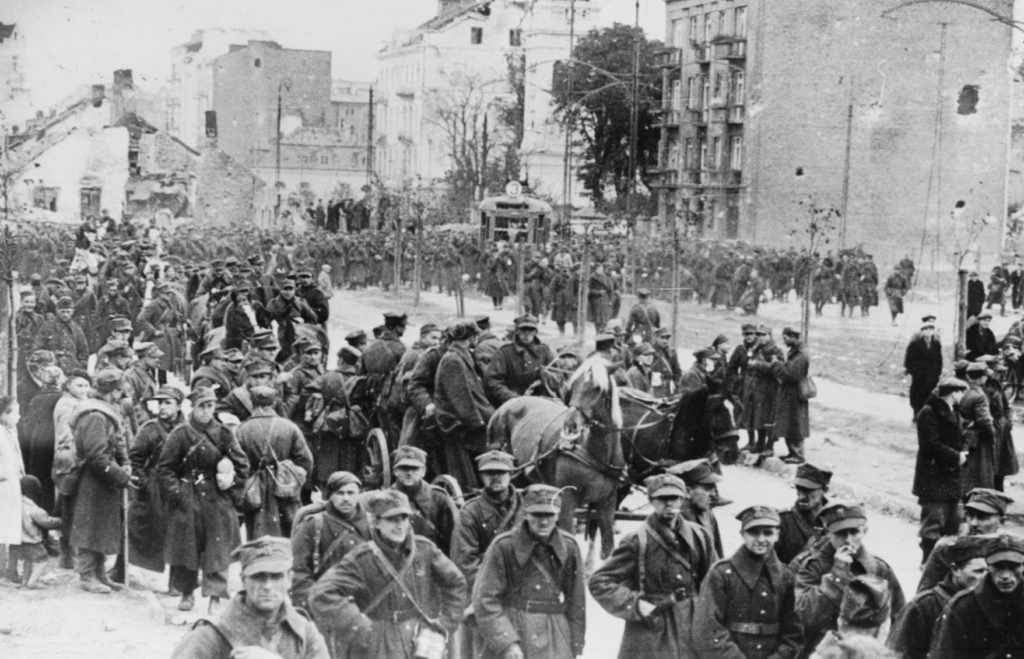
This reads at first glance like something of an over-simplification, and indeed it is, if not by much. Certainly, Josef Stalin was a monster who believed that the triumph of Communism was an historical inevitability. He believed, as Karl Marx had written in the Communist Manifesto, that the proletariat would overthrow the bourgeoisie. “What the bourgeoisie, therefore, produces, above all, is its own grave-diggers. It’s fall and the victory of the proletariat are equally inevitable.” Except, of course, that they were not. Stalin had his sights set on expansion and the pact ascribed to Molotov and von Ribbentrop was really negotiated directly between Josef Stalin and Adolf Hitler.

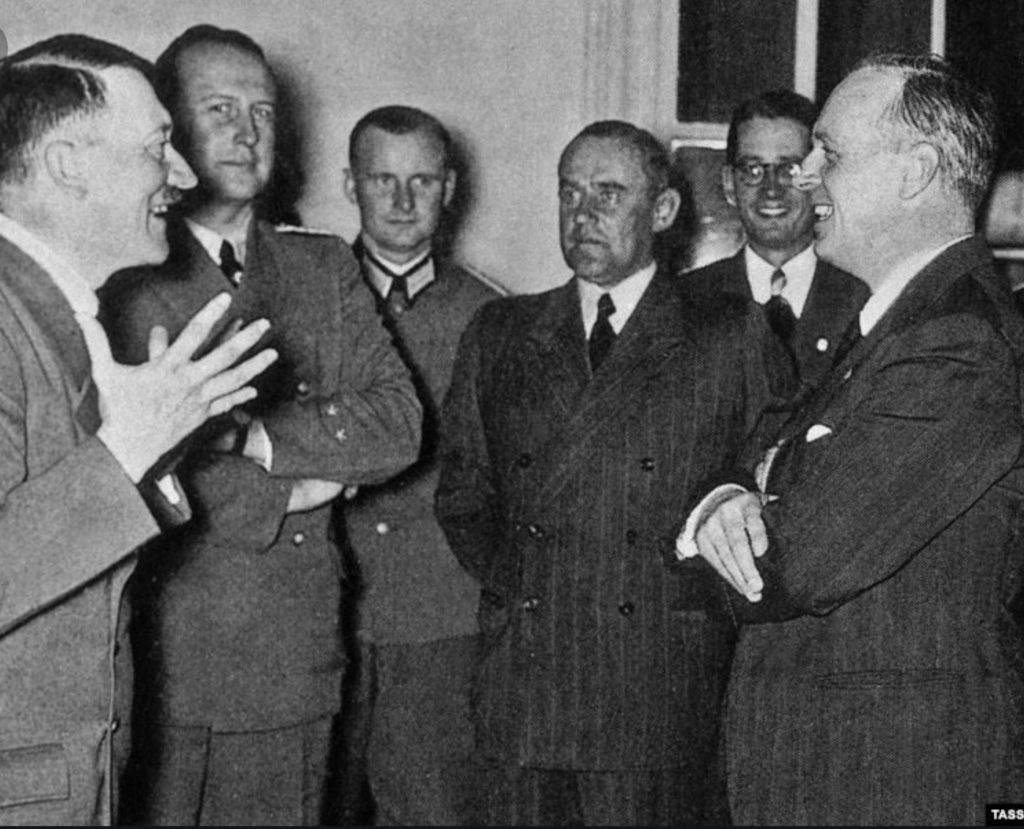
Stalin received a personal letter from Hitler on 21 August, 1939, making clear Germany’s intentions towards Poland; some historians believe the two dictators were exploring a long-term alliance. Von Ribbentrop arrived in Moscow two days later and met both Stalin and Molotov. The deal that was agreed contained a secret protocol, proposed by Stalin, which detailed ways in which the two powers would divide up Eastern Europe. In that respect the Polish-drafted European
Parliament resolution has a basis in fact: two ambitious dictators determined to rule the world. Stalin’s latest biographer, Oleg V. Khlevniuk, wrote: “Stalin took total responsibility for the ‘friendship’ with Germany and doubtless had very specific motives for entering into the risky alliance.” He goes on to examine those motives in more detail, because they are complex and hard to decipher. “Stalin, no doubt, was fully aware of the agreement’s political and moral undesirability. We can infer this from the persistence with which the Soviet Union denied that a secret protocol existed.
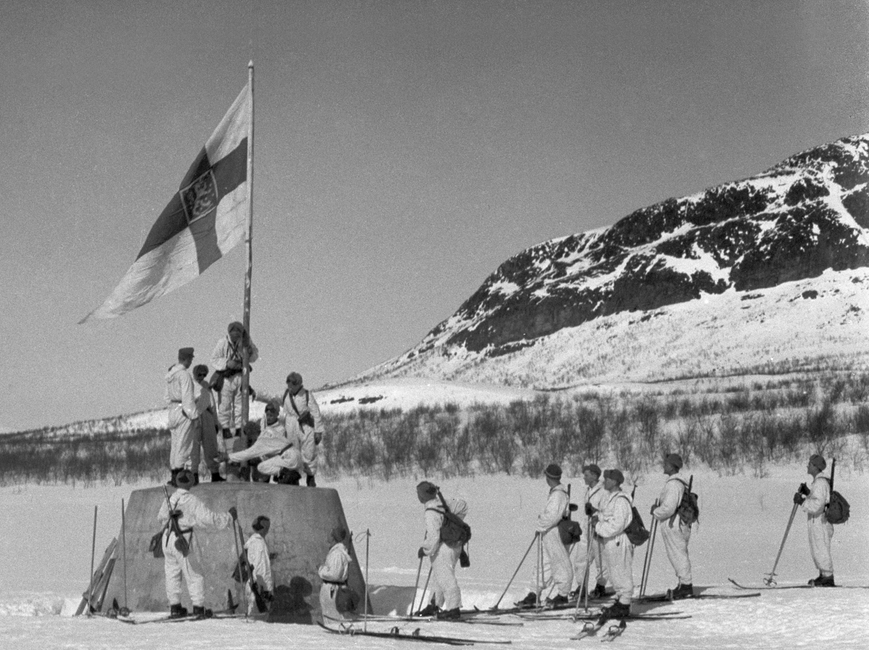
It’s worth remembering, however, that the “great terror” Stalin had imposed on the Soviet Union in the latter half of the 1930s had eroded a lot of sympathy and support from other countries, including those with theoretically left-leaning governments. Stalin was not keen on joining Britain and France in declaring war on Germany over its inevitable invasion of Poland. After negotiations for an anti-German alliance, Stalin believed the two western powers were trying to get Russia to do their fighting for them. By dealing directly with Hitler, not only could the Soviet Union could stay out of the war, Stalin’s secret protocol would allow Poland and the Baltic states of Estonia, Latvia, Lithuania and Finland, to be divided up into Soviet and German territories. It was because of the Molotov-Ribbentrop Pact that the Red Army (eventually) joined in the German attack on Poland, recapturing western Belorussia and western Ukraine, both of which Russia had lost to Poland in the Russo-Polish War of 1919-20. Estonia, Latvia and Lithuania were quickly compelled to allow Stalin to establish military bases there, especially at the ports.
KEEPING THE WOLF FROM THE DOOR
In appeasing Hitler, Stalin was not alone; Britain and France were also guilty of decisions they would later regret as they strove to avoid war. On the other hand, some of the reasons Stalin gave for signing the Pact seem dubious at best. In an unverified speech to the Politburo, quoted in a French journal in 1939, Stalin is supposed to have said: “We are absolutely convinced that if we conclude an agreement to ally with France and Great Britain, Germany would be forced to give up on Poland and seek a modus vivendi with the Western powers. War would be averted and the subsequent source of events would prove dangerous for us.” With hindsight, it’s difficult to believe he really thought that, or even said that, but perhaps he favoured a war because it would weaken the west and allow the Soviet Union to expand, as some historians have suggested.

Unravelling Stalin’s thinking processes was never an exact science; it’s hard to second-guess a genocidal maniac. On the other hand, there is no other record of the speech having been made, nor of a Politburo meeting on the day claimed. According to Khlevniuk there is more definite evidence of his thinking in the diary of Georgy Dimitrov, then head of the Communist International, Comintern, who quotes a speech supposedly made by Stalin on 7 September, when he is claimed to have said: “We would rather have reached agreement with the so-called democratic countries, so we conducted negotiations. But the English and French wanted to use us as field hands and without paying us anything! We, of course, would not work as field hands, especially if we weren’t getting paid.” Khlevniuk says the 3-way negotiations failed because of faults on all sides; Stalin believed war between Germany and Poland was inevitable (he was right) which would bring Nazi forces to his borders. Better, then – at least in his view – to have an agreement to keep them at arm’s length. Meanwhile, criticism of Germany or the Nazis became a punishable offence in the Soviet Union.
There was further pressure for a deal because of the fighting that erupted between Soviet and Japanese forces in Mongolia, but the victory at Khalkin-Gol not only proved the military strength of the Red Army, but earned the man who would become Russia’s top general, Georgy Zhukov, the title ‘Hero of the Soviet Union’. It also strengthened Stalin’s hand in his negotiations with Hitler. It is easy to see the deal as a most unsavoury agreement and, indeed, the existence of the protocol has long been denied, with copies of it being dismissed as forgeries whenever they turned up. But as a pragmatic way to buy time, the Pact was, perhaps, understandable, if reprehensible. Some have described it as being like “shaking hands with the devil”, but since both men were devils, the agreement loses some of its shock value. Even so, Stalin played it safe: the Soviet invasion of Poland began seventeen days after the Nazis had swept through the country virtually unopposed. Then Russia invaded Finland only to meet fierce resistance.
The Red Army had already won its concessions from the other Baltic states but ran into great difficulties from the Finns. Stalin wanted to place military bases in Finland to protect Leningrad, which was not only Russia’s second-largest city but was also producing weapons and had access to the Baltic Sea. The Soviets wanted to trade less populated and less important land for strategically more important territory near to the city in order to defend it against German aggression. Even then he clearly realised that Hitler had his sights set on Moscow. The Finns refused to cooperate and the Red Army invaded. Despite a massive military imbalance – 26 Finnish tanks against 1,500 Soviet ones – the strong resistance of the Finns, plus worldwide condemnation from around the world, which included the Soviet Union’s expulsion from the League of Nations, saw Stalin forced to withdraw, although not without some territorial gains. However, France and the United Kingdom had expressed a willingness to come to Finland’s aid and the Red Army lost some 130,000 troops. Losses on the Finnish side, although significant, were far fewer: 23,000 dead and 44,000 wounded.

were deported, either to the East, or
to Germany as slave labor
Still licking his wounds from this so-called Winter War Stalin then faced a new and much greater problem: the rapid defeat of France left him insufficient room to manoeuvre, and his deal with Hitler began to look not only shabby but weak. He quickly set about the “sovietisation” of his new Baltic territories but was facing tension with Nazi Germany because both countries needed oil and their interests didn’t coincide. Things got worse, however, when Germany, Italy and Japan signed their Tripartite Pact, agreeing to help each other divide up the entire world. The Pact was mainly aimed against the United States and Britain but Stalin could see the writing on the wall. Molotov was despatched to Berlin to negotiate with Hitler and there was even talk of the Soviet Union becoming a fourth partner, but in reality, Hitler was already planning Operation Barbarossa: German-led forces launched what they called a blitzkrieg attack on 22 June, 1941. Within just a few weeks, the Red Army had suffered the greatest series of defeats in military history, with millions dead or injured as the Russians retreated to the gates of Moscow and Leningrad.
The attack was not something Stalin was expecting, even as he bulked up and re-equipped the Red Army in readiness for conflict. He had begun to see, as Neville Chamberlain had after meeting Hitler in Munich, that a piece of paper would never be enough to stop the Nazis. There is no doubt that the Molotov-Ribbentrop Pact facilitated the Second World War and made it possible but it only made it inevitable because Hitler never doubted German superiority nor the inevitability of a Nazi victory. And he wanted to conquer the world by force to give the German people ‘lebensraum’ – living space, other people’s territory to colonise.
The problem is that the Polish government of today sees itself as not just a defender of Polish laws, trade and defence but also of its morals, and it doesn’t tolerate those who disagree with it or who publicise alternative views. Since taking power in the 2015 election, PIS has placed sections of the media in the hands of party sympathisers and tried to nobble the Supreme Court by forcing judges to retire early. It changed its mind on that one eventually and with great reluctance under pressure from the European Commission. On a very conservative TV channel owned by a Catholic priest, the leader of PIS, Jaroslaw Kaczynski, warned viewers that the opposition, if elected, would lead to the “radical destruction of the moral and cultural order”. His interviewer was wearing full clerical garb, including a cassock.
Kaczynski sees gay people – all gay people – as representing an attack on the family. Not even his fiercest critics dare to promote the adoption of children by couples in a same-sex relationship because most Poles oppose the idea and the Catholic church agrees with that view. Homophobic rhetoric is common in political debate, much of it unpalatable to more liberal societies, although there is now a progressive political party, Wiosna, that was created by a gay-rights campaigner. Poland under PIS does not accept criticism; it is illegal there to suggest that Poles were complicit in Nazi anti-semitism The Poles calls such claims “false narratives”, although Jewish survivors of the war have claimed it happened before the Germans got there.
INDUSTRIALISED EXTERMINATION
Before the Holocaust, Jews made up the largest minority in Poland, comprising some 25% of the population. In the shtetls, or market towns, Jews and Poles bought and sold from each other, living side-by-side and often speaking each other’s languages. The Nazis, though, wanted the entire country for Germans to settle in. They closed all schools so that the new German masters of the country would gain an illiterate slave class to serve them. They also rounded up all of Poland’s Jews, providing railway lines to convey them to the extermination camps they built, such as Auschwitz, not far from Krakow. By 1945, almost five million Poles had been murdered, three million of them Jewish. When I visited the place, my guide was a non-Jewish Pole who resents the way the slaughter has been claimed by only one set of victims, even though most of the victims were Jewish. The Nazis also slaughtered people with disabilities, gay people, Jehovah’s Witnesses and Slavs opposed to Nazi rule, especially Communists. Also working at the camp was the utterly despicable Josef Mengele, the SS officer and doctor who performed terrible, painful and usually fatal experiments on inmates. The place is still terrifying, so long after it was in use, with an atmosphere that remains oppressive to this day. As they withdrew, the SS dynamited most of the gas chambers but not the first one, set inside the original camp, known as Auschwitz 1, with its twin crematoria.

My Polish guide said that on arrival at the rail head, those who looked too frail were separated and taken for instant slaughter. Others were to face hardship, starvation, mistreatment, forced labour and death. “The camp commander spoke to us,” he told me, “Pointing to the chimneys over the crematorium, he told us that the only way we would ever get out of Auschwitz was as smoke up those chimneys, when our bodies were burned.” This particular Pole did survive, of course, but most of the internees did not, leaving behind their few possessions so that today’s visitors can see the massive glass cases of battered suitcases, spectacles and hundreds upon hundreds of photographs: close-ups of faces showing terror and horror, faces of frightened people who know that all hope is gone.
With me on that visit was former Auschwitz inmate and French politician Simone Veil, a Jewish woman who survived to become the first elected president of the European Parliament following the introduction of direct elections. She explained what life had been like there for inmates, stripped of respect and dignity by an unthinking, inhuman machine that had industrialised mass murder. She had been a child at the time. A German MEP on the same visit told me that it was not just the internees of Auschwitz who had been murdered there, but the soul of Germany itself. He was in tears at the time. Although the Auschwitz extermination camp was based in Poland, it was not, of course, operated by Poles. It was a German institution. Initially, it had been just a disused army barracks. When it was converted into a place in which to slaughter large numbers of people, the infamous ‘arbeit macht frei’ sign over the entrance was erected. It was always a lie, but a lot of lies were told over how Germany and the Soviet Union divided Poland between themselves
When the Nazis invaded, they put their own SS soldiers into Polish uniforms and launched an attack on a German radio station, thus justifying the invasion and the murders of real Poles, dressed up in German uniforms and then murdered, simply to be put on display to visiting American newspaper journalists. This plan was to provide Hitler with ‘justification’ for invading Poland: an ‘unprovoked’ attack on German facilities by ‘those wicked Poles’. It didn’t have to look convincing and it wasn’t. For the Russians, the invasion was described as offering a helping hand to the ‘workers of Western Ukraine and Western Byelorussia freeing them forever from social and national bondage’, as Anne Applebaum, senior fellow of the Agora Institute at Johns Hopkins University, quotes from a contemporary article in the Red Army newspaper, Red Star.
HEROES OR VILLAINS
Applebaum, who is married to a Polish MEP and who wrote the book Iron Curtain about the Soviet takeover of Eastern and Central Europe, believes that Putin sees this as a good time to make a noise about the resolution. Poland’s government is nationalist, even nativist, and is not only seeking judicial reform to create a form of justice that suits its ultra-conservative views but also plans to impose a law making it illegal for any judge to query the move. It will bring Poland once more into conflict with the European Union and also, most probably, into conflict with the European Court of Human Rights, which is not part of the EU, of course, but overseen by the Strasbourg-based Council of Europe. Poland wants to project its image as victim – of both the Nazis and the Communists – and heroic fighter for freedom and democracy. That’s not easy to do when you are in the process of attacking democracy and the independence of the judiciary.

columnist Anne Applebaum
© Will Kirk/Johns Hoptkins University
Applebaum believes that some PIS politicians are now more anti-EU than anti-Russia. Writing in The Atlantic, she says that later in January, “Putin will be the main speaker at an Israeli event to mark the 75th anniversary of the Red Army’s liberation on Auschwitz, and that will be another moment to make the same argument.” She thinks Putin is also testing the waters to see which way public sympathy goes as Poland moves increasingly towards authoritarianism; will the world give credence to his suggestion that many Poles were complicit in Nazi atrocities? Previous testimony from Polish Jews suggests that at least some were, even allegedly rounding up Jewish neighbours ahead of the Germans’ arrival so as to make a ‘gift’ to the invaders and showing them whose side they were on. Given what the Nazis then did to the Poles and their country, such an action seems somewhat unlikely and most certainly doomed to failure.
According to Applebaum, PIS routinely denounce immigrants and gay rights but may be frightened of Russia, while admiring its “open racism and aggressive nationalism”. At the same time, Putin’s plea of “not guilty” on Russia’s behalf to all charges doesn’t square with a known and documented atrocity perpetrated by Soviet forces.

In April, 1943, the occupying German forces uncovered eight large burial sites in the Katyn Forest, not far from Smolensk, containing the remains of some 22,000 Polish Army officers and intellectual leaders who had been interned at the Soviet prisoner-of-war camp at Kozielsk. In addition, the bodies of prisoners who had been housed at Ostashkov and Starobielsk were discovered near Piatykhatky and Mednoye, respectively. The so-called Katyn Forest Massacre most certainly took place, although after the Soviets recaptured Smolensk they re-examined the corpses and claimed they were victims of mass killing by Nazi forces, carried out in 1941.
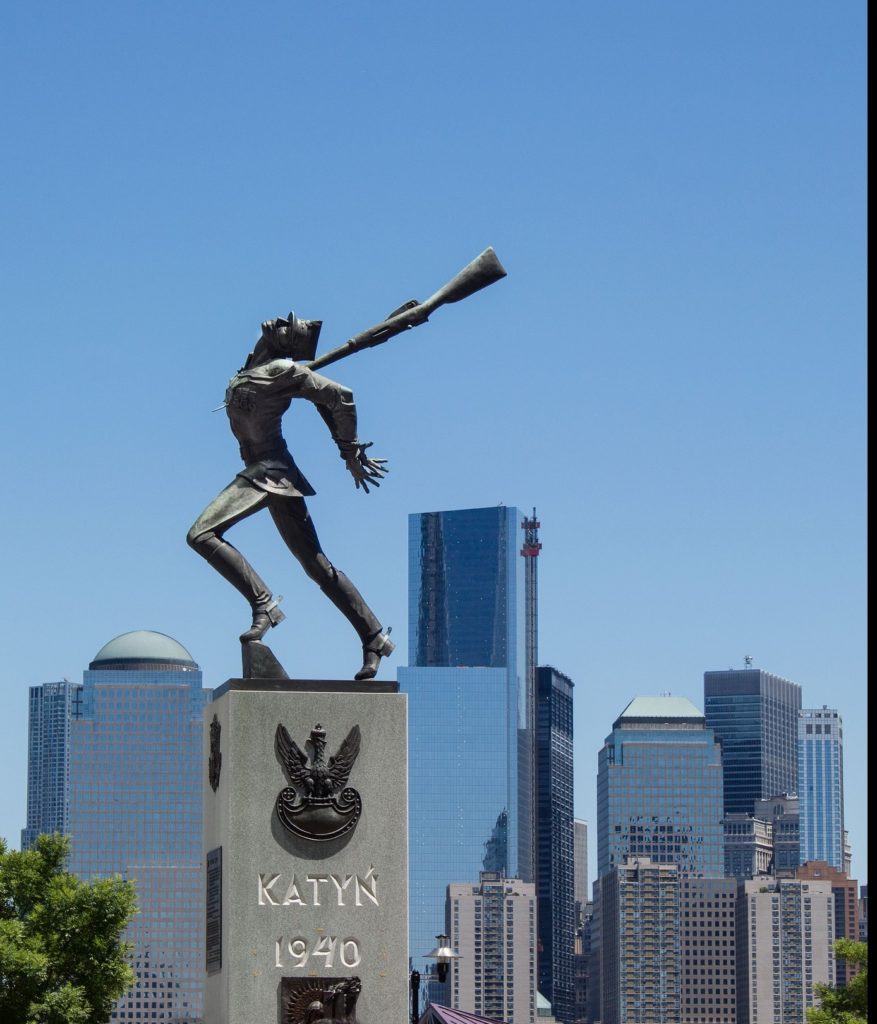
in Jersey City, New Jersey, commemorating
the massacre of 1940
© Eleanor Lang
There’s very little evidence to support that claim and in 1951, the US House of Representatives set up a Select Committee to look into the deaths under the chairmanship of Republican congressman Ray J. Madden of Indiana. The Committee decided unanimously that Russia’s NKVD secret service was responsible, which should settle the matter, although we must bear in mind that the Committee sat at the height of the Cold War and could have been influenced by strong anti-Soviet feeling. That possibility does seem, however, extremely remote. Meanwhile, seeking to be seen as on the side of the angels, Putin has condemned Poland’s pre-invasion ambassador to Berlin, who is claimed to have praised Hitler’s plan to deport Jews from Europe. Oh, and he also says Chamberlain’s Munich Agreement in 1938 was an example of ‘collusion’ with Hitler. Applebaum has even suggested that he is trying to portray Russia as a victim of the war, entitled to compensation. That would certainly stick in the craw of the Baltic states who were ruled by undemocratic Communist regimes for half a century because of the Molotov-Ribbentrop Pact and its secret protocol.
STICKS AND STONES
Why should Poland seek to discredit Russia at this time? And why, for that matter, should Putin seek to discredit Poland? For one thing, Poland has sought to blame Russia for the death of its then President, Lech Kaczynski, in 2010, whose plane crashed in the Katyn Forest. He, his wife and a number of Polish politicians and military personnel were on their way to a service of remembrance for the victims of the original massacre. The finger of suspicion pointed at Moscow because many of those killed had played leading parts in overturning Communism in Poland. Moscow hasn’t forgiven Warsaw for accusing it of involvement in the original deaths, either.

Furthermore, Russia has been engaged in rewriting history to rehabilitate the Molotov-Ribbentrop Pact and downplaying its rôle in World War II. It’s this tendency by the current Russian regime to rewrite history that inspired Oleg Khlevniuk to write his biography of Stalin. In his preface to the book he writes: “Lately, the paradoxical turns of recent Russian history, the large-scale poisoning of minds with myths of an ‘alternative’ Stalin – one whose effective stewardship is held up as a model worthy of emulation – have given my research more than scholarly relevance.” Khlevniuk writes that too many modern histories are little more than apologias, contributing to the Stalin myth. “The impact of this powerful ideological assault on readers’ minds is intensified by the circumstances of Russian life,” he says, “which include rampant corruption and outrageous social iniquities. When they reject the present, people are more likely to idealize the past.” Khlevniuk was determined to show just what a monster Stalin was and why he should most certainly not be emulated or admired, although there are still old people in Russia who hanker after the ‘good old days’ under Uncle Joe.

There is another reason for Putin to discredit Poland, especially at the moment. Not only is Poland the largest and most important of the Eastern European NATO countries, but it has been trying to entice Donald Trump to place a US armoured division on its soil, offering $2-billion (€1.8-billion) to set up what is being jokingly referred to as ‘Fort Trump’. America recently sent an extra 1,000 troops to join the 4,500 already there.
The Fort Trump plan, with its massive force of tanks and mobile artillery, seems to be a non-starter as yet – the troops will be spread across six locations in Poland – but it’s still a considerable presence right on Putin’s doorstep. Furthermore, there is still talk of agreeing a seventh site where the tanks could be based. Meanwhile, Poland has agreed to spend more than $11-billion (almost €10-billion) on American armaments, including rocket launchers, air defence systems and war planes. More orders are said to be on the way, including anti-tank missiles. So far, Trump has said the military build-up in Poland is not intended as a warning to Russia but is simply because Trump likes Kaczynski. There’s nothing like demonstrating friendship with a bouquet of missiles.
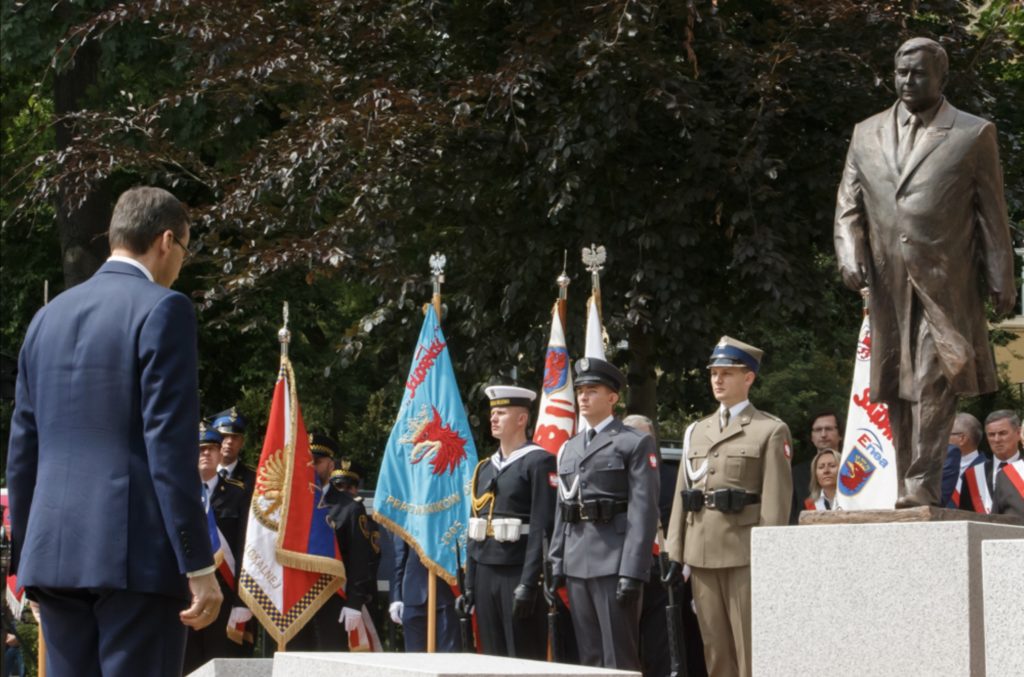
© Kancelaria Premiera / Krystian Maj
And not only has Poland got a healthy economy, with 5.1% growth last year, it’s also the country that proposed the EU trade treaty with Ukraine which ended with pro-Moscow president Viktor Yanukovych being forced to resign and flee the country. In fact, Poland has been a thorn in the side of Putin’s foreign policy ambitions for a long time.
Putin is an ambitious man; he wants Russia to swallow Belarus, making it a province. Talks have been going on to achieve that, mainly through the pricing of the gas Belarus needs and Russia has in abundance, but Belarussian President Aleksandr Lukashenko is finding the going tough. With the wrangling on the point of collapse, Russia turned off the taps just a few hours before a US drone killed Iranian General Qassem Soleiman; nobody commented on this blatant act of blackmail at the time. As reported in Belarus News (eng.belta.by), Lukashenko has accused Russia of trying to squeeze his country, with Gazprom charging Minsk three times as much for gas as it charges Germany. It does seem an ironic state of affairs so close to the anniversary of the Soviet victory over Nazi Germany. The problem is that Belarus is small and has few friends apart from Russia, which means Russia acts the bully. But any thought of total separation is unrealistic, according to Lukashenko. “If we did that, you and I wouldn’t exist now,” he told a press conference, according to Belarus News. “Russia is not just a huge country and a friendly nation. It is a country we bought raw materials from. And most importantly it is our common market. Since there is an abundance of raw materials, we can buy them in any country.” He cited Ukraine as an example of what can happen to any neighbour that dares to challenge Russia. He could have cited Moldova, too, now in the hands of a pro-Moscow government; Putin seems determined to re-establish the Soviet Union, albeit as an oligarchy, rather than a Communist entity.
REINTERPRETING THE PAST
Poland’s motives for tabling that controversial European Parliament resolution are harder to understand. Was it just a fit of pique that made them want to tweak the tiger’s tail? Or are they trying to rewrite their own history? Nobody doubts that Poland suffered greatly as a victim of two monolithic regimes run by blood-soaked tyrants. That is no longer the case, although its chosen government seems to favour autocracy. For Poland, more conflict lies ahead as its illiberal agenda clashes with its commitments under the EU treaty. Putin, no lover of the EU, might well have supported such a stance, but the Polish resolution has clearly angered him. The whole thing would have been better if the resolution hadn’t played the blame game.

© WikimediaCommons
Now we have Putin claiming that Russia was forced into agreeing the Molotov-Ribbentrop Pact by other European nations signing non-aggression agreements with Hitler. So, it was all Neville Chamberlain’s fault. Except that it wasn’t, of course: Stalin wanted to avoid a war with Germany and to annex the Baltic countries. Chamberlain wanted to avoid a war but also wanted time for Britain to re-arm. He didn’t seem to see the surrender of Czechoslovakia to Hitler as particularly significant: “How horrible, fantastic, incredible it is that we should be digging trenches and trying on gas-masks here because of a quarrel in a far-away country between people of whom we know nothing.”
It wasn’t Germany, despite its ghastly leader, that inserted the secret protocol into the Molotov-Ribbentrop Pact and there was no pressure from other western nations to make mere criticism of Nazism an offence under Soviet law. Stalin seems to have seen Hitler as something of a kindred spirit, despite holding views that even Stalin is said to have found repulsive. So now we come to marking the anniversary of the worst war in history and we seem no closer to agreeing on the narrative. Winston Churchill said that “history is written by the victors” but the problem here is that there were a lot of victors and a lot of losers. The defeat of the Nazis for Poland meant decades of rule by pro-Russian Communists, even if they did rebuild the historic parts of Warsaw the Nazis had blown up simply because they had lost. It meant much the same for other Baltic states and no-one is too keen on those ‘wedding cake’ buildings that were gifts from Stalin. We can’t simply forget the war and the terrible things that were done on all sides. Nor should we. But today’s leaders don’t have personal memories of the conflict, so can pick and choose their versions of what happened from the available literature, whilst using the lessons they take from that to shape their excuses for making the same mistakes again. As the historian A.J.P. Taylor wrote about Napoleon III: “Like most of those who study history, he learned from the mistakes of the past how to make new ones.” Some things never change.
Robin Crow
Click here to read 2020 February’s edition of Europe Diplomatic Magazine


